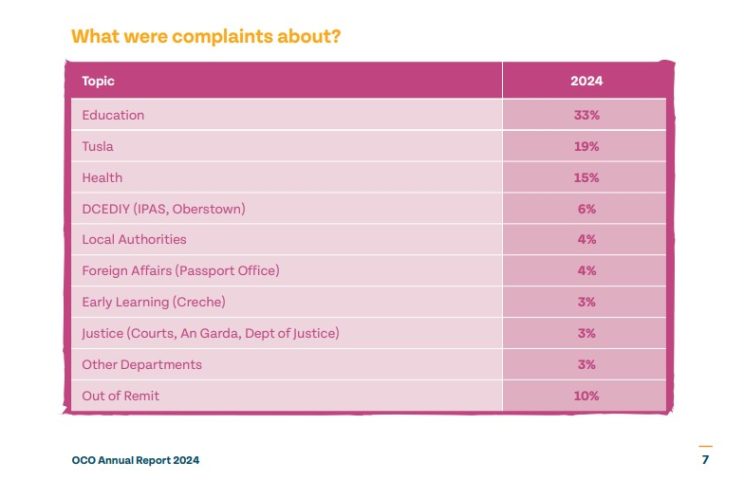The Ombudsman for Children’s Office received 371 complaints regarding the content of new Social Personal and Health Education (SPHE) materials in schools last year, accounting for one in five of all complaints, the largest number in any category.
The OCO said it received 1,772 contacts in total relation to complaints for 2024: and that this was almost identical to the number received in 2023.

33% of complaints were in relation to Education while another 19% concerned Tusla. 15% of complaints were categorised as Health, and 6% or some 106 complaints were in relation to the Department of Children, Equality, Diversity, Integration and Youth – specifically in relation to IPAS centres or to Oberstown, a youth detention centre located in the north part of County Dublin.
The OCO Annual Report report said that within the figure of 1,722 complaints are 1,401 individual complaints, alongside 371 complaints that were made as part of a campaign about the same issue, the SPHE syllabus.”
That would mean that some 22% of all complaints made to the Children’s Ombudsman in 2024 were in relation to the content of the SPHE syllabus in schools. 79% of all complaints received by the Ombudsman are from parents.
That syllabus, and the content of SPHE schoolbooks, continues to be the cause of controversy, in particular around the inclusion of gender ideology and of what some see as excessively explicit material.
In addition, in August 2024, the portrayal of an Irish family, Family A – who enjoyed GAA and Irish music – in a SPHE handbook for schools as being bigoted, insular, and small-minded in contrast to a more diverse family was described as being “anti-Irish”, “sneering” and “wrong-headed”.
TDs have expressed serious concern regarding the inclusion of explicit material and exercises in SPHE handbooks and in courses in which teachers say they were asked to participate in exercises for the classroom.
Gript asked the OCO how the Ombudsman responded to the complaints, and if any action was taken, but a response has not yet been received.
Independent TD, Carol Nolan, took issue with the OCO’s description of SPHE complaints as a “campaign. “If there is any ‘campaign’ going on it is the campaign to downplay serious parental concerns by an ideologically invested group… who appear to have no grasp whatsoever of how far removed they are from what constitutes age-appropriate material,” she told the Irish Catholic.
“Parents and teachers I speak to are operating from a place of deep and genuine concern,” Ms Nolan said, “Any attempt to frame them as fringe or unreflective of broad concern right throughout our communities will fail. It is a tactic that has had its day. Parents are now alert to the extremism that exists in bodies and agencies tasked with drawing up our curricula.”
In 2023, Gript reported on correspondence showing that the OCO said it found no issue with the state funded NGO advising teachers and youth workers to lie to parents about their children’s gender and sexual orientation.
A complaint to the OCO, lodged in February of 2023, notified the OCO that a handbook being used to train teachers and youth workers contained an explicit instruction for those professionals to lie to parents rather than ‘out’ a child. The complaint alleged that the handbook was “sent to schools around the country and BeLongTo claim in their promotional material to have delivered this training to hundreds of schools and thousands of children.”
In response, the complaints and investigations team of the OCO said that this advice did not constitute a child safeguarding issue and that the guidance “allows schools to act in the best interest of children and in conjunction with their parents and families, where appropriate to do so,”
TUSLA, HEALTH SERVICES
The OCO Annual Report said that of the complaints received by the OCO concerning Tusla (19%), these “related to children in residential and special care, interagency work between services, Education Support Services (TESS), access to interventions and support, as well as concerns from young people about complaint handling.”
In addition, in 2024, 15% of complaints to the OCO were about Health services. These included issues over access to Children and Adult Mental Health Services (CAMHS), children in hospital beyond medical need, a lack of access to an Assessment of Need and other HSE funded services.
Another 3% of all complaints received in 2024 concerned Children’s Disability Network Teams.
4% of complaints received by the OCO in the period concerned local authorities and the Department of Housing. These complaints related to the quality of housing, waiting lists, accessing emergency accommodation and a lack of access to appropriate housing for children with disabilities.